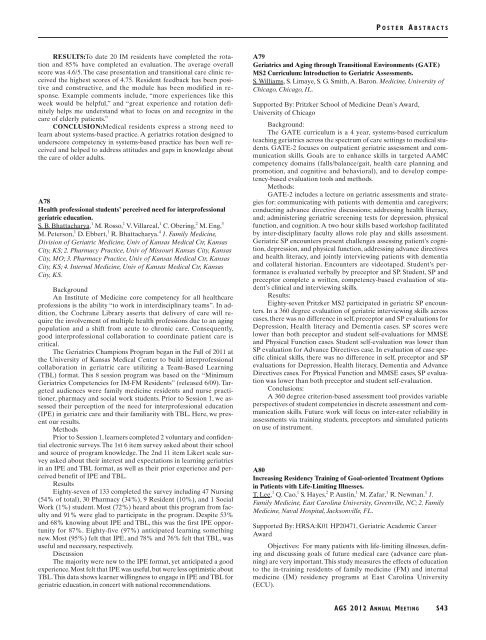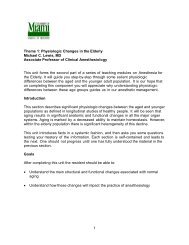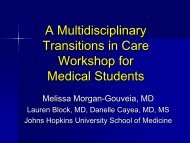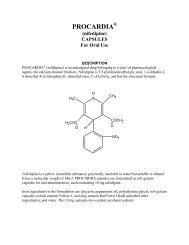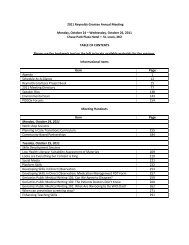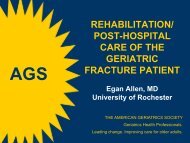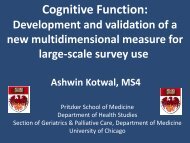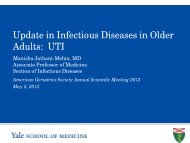Here - American Geriatrics Society
Here - American Geriatrics Society
Here - American Geriatrics Society
Create successful ePaper yourself
Turn your PDF publications into a flip-book with our unique Google optimized e-Paper software.
P OSTER<br />
A BSTRACTS<br />
RESULTS:To date 20 IM residents have completed the rotation<br />
and 85% have completed an evaluation. The average overall<br />
score was 4.6/5. The case presentation and transitional care clinic received<br />
the highest scores of 4.75. Resident feedback has been positive<br />
and constructive, and the module has been modified in response.<br />
Example comments include, “more experiences like this<br />
week would be helpful,” and “great experience and rotation definitely<br />
helps me understand what to focus on and recognize in the<br />
care of elderly patients.”<br />
CONCLUSION:Medical residents express a strong need to<br />
learn about systems-based practice. A geriatrics rotation designed to<br />
underscore competency in systems-based practice has been well received<br />
and helped to address attitudes and gaps in knowledge about<br />
the care of older adults.<br />
A78<br />
Health professional students’ perceived need for interprofessional<br />
geriatric education.<br />
S. B. Bhattacharya, 1 M. Rosso, 1 V. Villareal, 1 C. Obering, 2 M. Eng, 3<br />
M. Peterson, 1 D. Ebbert, 1 R. Bhattacharya. 4 1. Family Medicine,<br />
Division of Geriatric Medicine, Univ of Kansas Medical Ctr, Kansas<br />
City, KS; 2. Pharmacy Practice, Univ of Missouri Kansas City, Kansas<br />
City, MO; 3. Pharmacy Practice, Univ of Kansas Medical Ctr, Kansas<br />
City, KS; 4. Internal Medicine, Univ of Kansas Medical Ctr, Kansas<br />
City, KS.<br />
Background<br />
An Institute of Medicine core competency for all healthcare<br />
professions is the ability “to work in interdisciplinary teams”. In addition,<br />
the Cochrane Library asserts that delivery of care will require<br />
the involvement of multiple health professions due to an aging<br />
population and a shift from acute to chronic care. Consequently,<br />
good interprofessional collaboration to coordinate patient care is<br />
critical.<br />
The <strong>Geriatrics</strong> Champions Program began in the Fall of 2011 at<br />
the University of Kansas Medical Center to build interprofessional<br />
collaboration in geriatric care utilizing a Team-Based Learning<br />
(TBL) format. This 8 session program was based on the “Minimum<br />
<strong>Geriatrics</strong> Competencies for IM-FM Residents” (released 6/09). Targeted<br />
audiences were family medicine residents and nurse practitioner,<br />
pharmacy and social work students. Prior to Session 1, we assessed<br />
their perception of the need for interprofessional education<br />
(IPE) in geriatric care and their familiarity with TBL. <strong>Here</strong>, we present<br />
our results.<br />
Methods<br />
Prior to Session 1, learners completed 2 voluntary and confidential<br />
electronic surveys. The 1st 6 item survey asked about their school<br />
and source of program knowledge. The 2nd 11 item Likert scale survey<br />
asked about their interest and expectations in learning geriatrics<br />
in an IPE and TBL format, as well as their prior experience and perceived<br />
benefit of IPE and TBL.<br />
Results<br />
Eighty-seven of 133 completed the survey including 47 Nursing<br />
(54% of total), 30 Pharmacy (34%), 9 Resident (10%), and 1 Social<br />
Work (1%) student. Most (72%) heard about this program from faculty<br />
and 91% were glad to participate in the program. Despite 53%<br />
and 68% knowing about IPE and TBL, this was the first IPE opportunity<br />
for 87%. Eighty-five (97%) anticipated learning something<br />
new. Most (95%) felt that IPE, and 78% and 76% felt that TBL, was<br />
useful and necessary, respectively.<br />
Discussion<br />
The majority were new to the IPE format, yet anticipated a good<br />
experience. Most felt that IPE was useful, but were less optimistic about<br />
TBL.This data shows learner willingness to engage in IPE and TBL for<br />
geriatric education, in concert with national recommendations.<br />
A79<br />
<strong>Geriatrics</strong> and Aging through Transitional Environments (GATE)<br />
MS2 Curriculum: Introduction to Geriatric Assessments.<br />
S. Williams, S. Limaye, S. G. Smith, A. Baron. Medicine, University of<br />
Chicago, Chicago, IL.<br />
Supported By: Pritzker School of Medicine Dean’s Award,<br />
University of Chicago<br />
Background:<br />
The GATE curriculum is a 4 year, systems-based curriculum<br />
teaching geriatrics across the spectrum of care settings to medical students.<br />
GATE-2 focuses on outpatient geriatric assessment and communication<br />
skills. Goals are to enhance skills in targeted AAMC<br />
competency domains (falls/balance/gait, health care planning and<br />
promotion, and cognitive and behavioral), and to develop competency-based<br />
evaluation tools and methods.<br />
Methods:<br />
GATE-2 includes a lecture on geriatric assessments and strategies<br />
for: communicating with patients with dementia and caregivers;<br />
conducting advance directive discussions; addressing health literacy,<br />
and; administering geriatric screening tests for depression, physical<br />
function, and cognition. A two hour skills based workshop facilitated<br />
by inter-disciplinary faculty allows role play and skills assessment.<br />
Geriatric SP encounters present challenges assessing patient’s cognition,<br />
depression, and physical function, addressing advance directives<br />
and health literacy, and jointly interviewing patients with dementia<br />
and collateral historian. Encounters are videotaped. Student’s performance<br />
is evaluated verbally by preceptor and SP. Student, SP and<br />
preceptor complete a written, competency-based evaluation of student’s<br />
clinical and interviewing skills.<br />
Results:<br />
Eighty-seven Pritzker MS2 participated in geriatric SP encounters.<br />
In a 360 degree evaluation of geriatric interviewing skills across<br />
cases, there was no difference in self, preceptor and SP evaluations for<br />
Depression, Health literacy and Dementia cases. SP scores were<br />
lower than both preceptor and student self-evaluations for MMSE<br />
and Physical Function cases. Student self-evaluation was lower than<br />
SP evaluation for Advance Directives case. In evaluation of case specific<br />
clinical skills, there was no difference in self, preceptor and SP<br />
evaluations for Depression, Health literacy, Dementia and Advance<br />
Directives cases. For Physical Function and MMSE cases, SP evaluation<br />
was lower than both preceptor and student self-evaluation.<br />
Conclusions:<br />
A 360 degree criterion-based assessment tool provides variable<br />
perspectives of student competencies in discrete assessment and communication<br />
skills. Future work will focus on inter-rater reliability in<br />
assessments via training students, preceptors and simulated patients<br />
on use of instrument.<br />
A80<br />
Increasing Residency Training of Goal-oriented Treatment Options<br />
in Patients with Life-Limiting Illnesses.<br />
T. Lee, 1 Q. Cao, 1 S. Hayes, 2 P. Austin, 1 M. Zafar, 1 R. Newman. 1 1.<br />
Family Medicine, East Carolina University, Greenville, NC; 2. Family<br />
Medicine, Naval Hospital, Jacksonville, FL.<br />
Supported By: HRSA:K01 HP20471, Geriatric Academic Career<br />
Award<br />
Objectives: For many patients with life-limiting illnesses, defining<br />
and discussing goals of future medical care (advance care planning)<br />
are very important. This study measures the effects of education<br />
to the in-training residents of family medicine (FM) and internal<br />
medicine (IM) residency programs at East Carolina University<br />
(ECU).<br />
AGS 2012 ANNUAL MEETING<br />
S43


